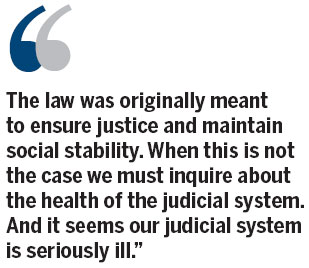Judicial domination hurting Hong Kong's public interest
Updated: 2014-01-08 07:17
By Leung Lap-yan(HK Edition)
|
|||||||||
Hong Kong's Court of Final Appeal (CFA) has decided that the minimum seven-year residence requirement for new immigrants to qualify for Comprehensive Social Security Assistance (CSSA) is unconstitutional. The ruling prompted many people to express concern about the increased financial pressure it might place on the social welfare system in future. This concern is shared by many citizens.
The truth is the CFA ruling's impact extends far beyond an estimated HK$300 million to HK$500 million a year in additional CSSA spending. By breaking the minimum seven-year residence requirement, the ruling is expected to open the flood gates for a deluge of applications for similar judicial reviews on welfare schemes such as the Old Age Living Allowance, Old Age Allowance, application for public housing and other regulations concerning new immigrants. The domino effect triggered by the CFA ruling will shake Hong Kong society much more than any increased CSSA spending will. The destabilizing effect of the ruling could be devastating.
The central government has emphasized repeatedly that Hong Kong's administration is executive-led instead of the typical tripartite government structure of Western societies today. But some people in the SAR's judiciary seem to think otherwise. They not only ignore Hong Kong society's uniqueness, but turn a blind eye to the legislative intent of the Basic Law. In their mind, the law is a trump card in their hand with which they can do whatever they want and make decisions according to their own political opinions, regardless how this will affect the public interest. This is not the first time they have made such a drastic decision at the future expense of Hong Kong society. Back in 2001 the High Court's ruling on the Zhuang Fengyuan case resulted in more than 200,000 children born in Hong Kong of non-local parents having to cross the border everyday to go to school in Hong Kong. The judges, who made that decision, insisted that they were upholding the law, but, what about the interpretation of the Basic Law by the National People's Congress Standing Committee (NPCSC)? Does the NPCSC clarification of the legislative intent of the Basic Law regarding right of abode for children born in Hong Kong of non-local parents not have jurisprudential grounds of its own?
It is common knowledge that a perfect law does not exist in this world. When the law has a grey area that can adversely affect society, the normal way to handle it would be to seriously consider the legislative intent of the law in question. Unfortunately some judges here love to use the "sword of law" - but they are not the blindfolded goddess of law. Their eyesight is good enough to see what is at stake and the enormous impact their decisions will have on society. But they could not care less about public interest because they would much rather demonstrate their judicial power; use the law to draw a line between the central authorities and themselves and show the world, as well as local society, that Hong Kong is still theirs after the handover.
There is no question Deng Xiaoping could not have foreseen the situation in Hong Kong today. The "One Country, Two Systems" principle has become "one country, two sides" and judicial independence has become judicial domination. Such domination serves as a protective cover for the opposition to do whatever they want with reckless abandon while keeping a leash on the HKSAR Government. The executive-led government structure is practically non-existent as the judiciary regularly threatens the executive wing with damaging decisions on judicial review cases. If this perverted state of affairs continues there will be no peace for Hong Kong.
The law was originally meant to ensure justice and maintain social stability. When this is not the case we must inquire about the health of the judicial system. And it seems our judicial system is seriously ill.
The author is a veteran current affairs commentator.

(HK Edition 01/08/2014 page1)